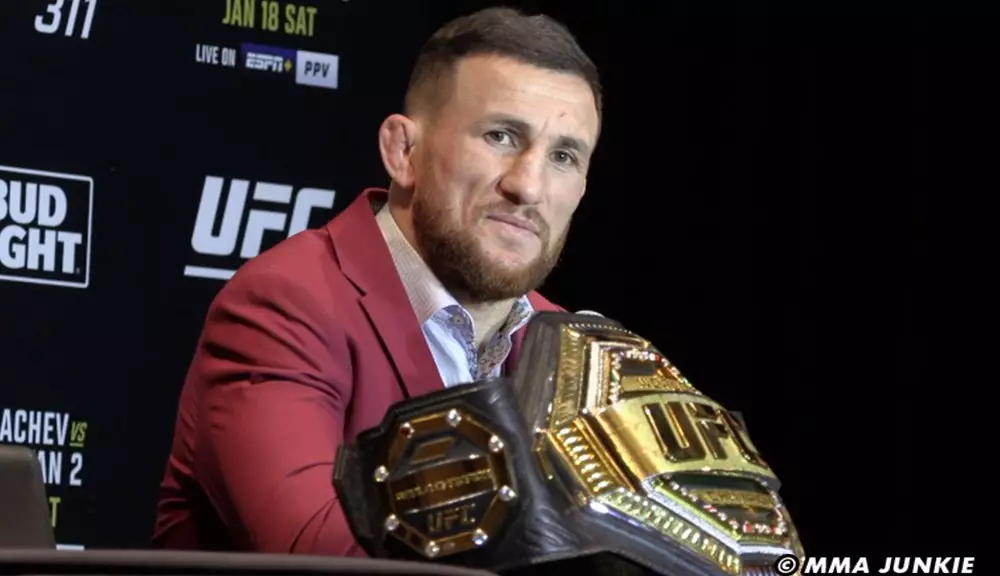As bantamweight champion Merab Dvalishvili stepped into the media spotlight prior to UFC 311, there was a palpable shift in his demeanor. Clad in a striking all-burgundy suit, he should have embodied the confidence typical of a champion; instead, he seemed weighed down by the pressures of title defense, particularly as he faced emerging rival Umar Nurmagomedov. Champions often rise to the occasion, yet Dvalishvili’s uncharacteristic low energy highlighted a complex mix of emotions and challenges threatening to overshadow his triumphs.
Having secured the 135-pound title in a commanding match against Sean O’Malley just months earlier, Dvalishvili’s desire for a longer break—a six-month recovery—was rooted in a personal need for time and space after facing immense pressure. The physics of fighting mean that champions like him are often in a state of perpetual readiness, but this time, the urgency felt premature as injuries loomed over his training regimen, making his preparation for this match notably burdensome. In an arena where physical form is paramount, mental preparedness should not be downplayed; however, the champion’s reluctance to divulge the nature of his injury emphasizes an age-old mentality within combat sports: vulnerability is to be avoided at all costs.
At the core of Dvalishvili’s pre-fight experience lies a brewing rivalry with Nurmagomedov, intensifying the stakes of their impending showdown. Their relationship, once characterized by mutual respect, took a drastic turn after tensions flared during a press conference. Dvalishvili’s attempts to emphasize that “it’s not about hatred” reflects a fighter’s delicate balancing act of channeling emotional energy without losing focus. Contempt in sports can serve as a motivator, yet Dvalishvili refrains from viewing it as a necessary fuel. “You guys know I was kissing Sean O’Malley,” he said, alluding to his jovial persona within the octagon. His insistence on maintaining respect, even amidst adversity, speaks volumes to his character and fighting philosophy.
Dvalishvili’s conviction that he is a legitimate champion and not a “fake champion,” as branded by Nurmagomedov, underscores the emotional stakes in their encounter. He articulated feelings of disappointment in Nurmagomedov’s disrespect, claiming a deep-seated friendship that seemed to evaporate under promotional pressure. This dynamic raises questions about the ethics of respect within sports rivalries, challenging fans and pundits alike to consider how personal relationships can complicate the competitive narrative.
Beyond personal rivalry is the technical intrigue their matchup promises. Both fighters, distinguished for their impressive winning records, are not merely contenders but arrive as skilled wrestlers who have demonstrated excellence in the cage. Dvalishvili, with an impressive 11-fight winning streak against elite competition, holds the edge in experience. In contrast, Nurmagomedov, maintaining an unblemished 18-0 record, possesses an air of invincibility that could carry its own weight in the octagon.
As these two combatants prepare to meet, the wrestling techniques honed over years will play a significant role in this bout. Given their backgrounds, fans can expect a high-caliber clash filled with strategic exchanges, and Dvalishvili’s arsenal will be tested against Nurmagomedov’s formidable skills. Yet, what may not be readily detectable in the initial stages of their fight will be the palpable tension born from unresolved conflict—a tension that can both inspire performance and introduce uncertainty.
Regardless of whether Dvalishvili retains his title or departs as a challenger, he remains committed to healing the rift with Nurmagomedov. His intent to reconcile highlights that competing in sports extends beyond mere victory; it involves the human element of respect and understanding. The champion’s hope to shake hands and “be good with him again” illustrates a deeper truth about the sport: that fighters are inherently interconnected beyond the octagon.
As fans prepare for what promises to be an electrifying match at UFC 311, the dichotomy of rivalry and respect will serve as a poignant reminder that beneath the bright lights and promotional theater lies the shared humanity of two individuals striving for greatness. Win or lose, Dvalishvili’s journey is emblematic of the struggles faced by athletes: negotiating the complexity of competition while remaining true to oneself.

